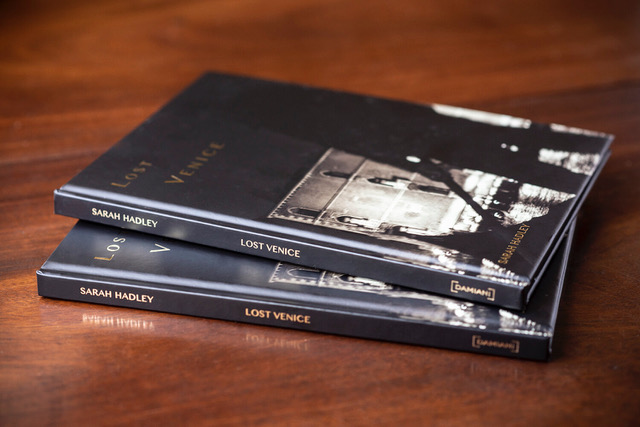 Lost Venice
Lost Venice
In her recently released book, “Lost Venice,” Sarah Hadley has revisited places that had been buried deep in her heart. Rather than take us among too-familiar landmarks, we are led through a city with many shadows, roads almost too narrow to navigate. It is a personal journey that many of us have wanted to take, but never did.
The first “bridge” to Venice is realized by where she grew up. Her father was the Director of the Gardner Museum, in Boston. Their apartment above the museum was designed to resemble a Venetian palazzo, and the building mirrored her father’s well-known passion for Italian Renaissance Art and architecture.
Her father took her to Venice in her younger years and continued to travel there until his untimely death, when she was in her 20s.
At Georgetown University she studied Art History and Italian, while she also studied photography at Corcoran College of Art. Both disciplines seemed to have been designed for her career, that of a photographer. Much of her award-winning has been displayed and collected by a wide range of museums and galleries throughout the world.
With ethereal diligence Hadley suffuses Lost Venice with images that warrant a dreamlike vision, almost enabling the viewer to wonder if they might be dreaming as well. We see an empty hallway with a bright light almost commanding us to enter, a lone figure pause (or does he?) at the end of a sidewalk. There is a boat entering a lighted patch of water. All in shadows. Mystery is woven into each page, and we wonder: is the mystery solved. Is that chapter at its end?
In the Foreword, Karen E. Hass, Lane Curator of Photographs, Museum of Fine Arts, Boston, writes that Hadley’s journey through memory and pain resulted in the publication of Lost Venice.
“Walking its narrow passageway and out-of-the-way neighborhoods, she was drawn to record such things as the shadowy silhouettes of figures disappearing into the mist, cloudy skies and birds reeling above tall dark buildings, and softly lit interiors creating reflections on water at night.”
Much is to be learned as each page is turned. The quality of the printing and the sepia-toned images afford a timeless look at something many of us would like to revisit, if only for a glimpse, a remembrance of time loss and a life regained, perhaps.
The addition of a conversation between Sarah Hadley and Susan Burnstine affords a close and intimate look into the minds two renowned contemporary photographers who each have wandered into “the dark night of the soul.” Burnstine is the author of two books and writes for Black and White Magazine (UK). She is an educator who is in wide demand.
Lost Venice is on my bookshelf as I write this, and I sincerely hope it will be on yours, very soon! It is a keeper!
